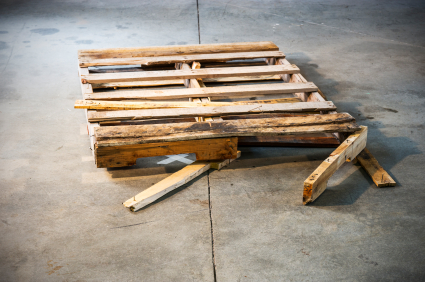Pallets are a surprisingly complex business. What appear to be a few boards of wood nailed together is actually a carefully engineered and thoroughly tested product. The average pallet can withstand loads of 2,205 pounds; and specialty pallets can carry much more. Pallets are responsible for safely storing and transporting millions of dollars worth of products; thus they are the foundation of many industries including construction, grocery, mechanical etc. When poor quality pallets make their way into useable inventory, problems can arise of an unpredicted magnitude. While trying to cut costs, companies that sacrifice pallet quality will usually fall victim to perils such as ruined goods, injuries and a damaged reputation.
How a Pallet Can Ruin Your Day
Pallets are one of those things that you do not think about until you either run out or something goes wrong. Pallets can fail in multiple ways:
- Protruding nails can tear packaging.
- Low quality wood can buckle under weight.
- Imperfections in construction can cause a load to tumble.
When a pallet fails, you waste product and risk injury. If the failure leads to delays in your customer receiving goods, your reputation suffers.
How Do Businesses Fall Prey to Poor Quality Pallets?
The most common reason a company finds itself the victim of unreliable pallets is a decision based solely on cost consideration. Cost is prioritized over quality because the importance of quality is not well understood. Wood is wood and nails are nails, so if one company can make a pallet out of a certain board footage for half the cost of another, why pay more?
When a pallet is designed for a certain load, the type of wood is one of the variables considered. Softwood may be used very effectively for lighter loads. Heavier loads, however, may require hardwood in order to withstand the weight.
Say, for example, you are given a pallet design that calls for red oak boards with a width of 3/8 of an inch and told that the pallet will withstand all the forces you intend to apply to it. You take that pallet design to another company who guarantees you a lower price on a pallet with 3/8 inch thick boards made of yellow poplar.
The latter offer is enticing, but in the end those pallets are not actually suited to your needs. Yellow poplar is not as strong as the red oak, and your pallets could buckle under their loads. For the cost-savings of the pallets, you have now potentially lost thousands of dollars of inventory due to pallet failure.
Pallets are engineered to withstand specific loads and conditions. Avoid the perils of poor quality pallets by seeking out a reliable and knowledgable pallet provider. Take the time to understand the design details before just going for the lowest cost option.
